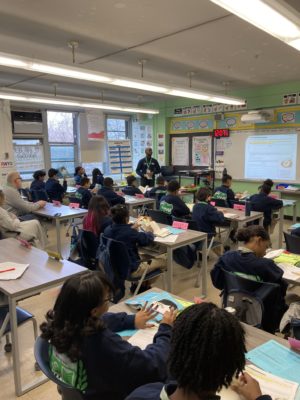02.01.23Little Things We Loved About Spencer Davis’ Retrieval Practice

Erica Woolway and I had a great visit to University Prep Middle School in the Bronx yesterday. What a warm and positive school with real rigor and a focus on knowledge. Kids focused, worked hard, took pride in their learning and seemed genuinely happy.
One of the classes we especially loved was Spencer Davis’ sixth grade English class, where they were reading Wonder–and by the way using the unit on the book from the Reading Reconsidered curriculum.
Erica managed to shoot some video of Spencer’s retrieval practice at the start of class and there was so much we loved about it–it was typical of things we loved about his teaching and about the school more broadly.
First, here’s the video
Big picture: Spencer’s Retrieval Practice starts with writing and then uses Cold Call and discussion to elaborate on initial answers. What you see here is students sharing and discussing and refining answers after they’ve written responses to each question. He uses a lot of Cold Call to make sure everyone is attentive and listening and thinking, and a lot of Right is Right to refine and improve answers. Students are constantly “building off” of one another- being asked to discuss one another’s thinking as they build long term memory of core concepts in and knowledge from the book. But so much of what makes the retrieval practice sing is in the details. Here are some of the little things we loved:
- We loved the way Spencer used little phrases to make the tone light and playful. Notice how when he asks what an anomaly is his pacing is playful, almost musical, and he Cold Calls a student by saying, “Take it away…”
- We loved his easy relaxed body language and use of gestures to make his Cold Calling seem especially warm and positive. Watch him when he smiles and says, “Define empathy…” or the curlicue gesture he makes when asking about the book’s nonlinear narrative.
- He uses a similar easy, playful style when a student freezes for a moment: “Read what you wrote on your pa-per…” he sings.
- It’s hints of playfullness and warmth that he relies on a lesson that is still rigorous and serious about learning. The constant grace notes, the little belonging cues he uses, work because he is so focused on learning. They never distract him from the task–he writes out the definition of anomaly carefully because understanding it, as he might say, “precisely” and not just vaguely is really important–and in fact those belonging cues would be less effective if the vibe wasn’t scholarly and focused–if the goal wasn’t top-quality answers. Warmth and camaraderie are not antidotes to hard work. They’re how they get work done in Spencer’s class. “Who is the narrator in part 6. How do you respond to this change in narrator? Turn to your bestie beside you. You have 60 seconds,” he says. It’s just a pinch of levity (and reminder that you are cared about in his classroom) sprinkled in briefly. He doesn’t have to overdo it!
- We love the moments where we connects the retrieval to the class’ previous experiences. For example: “Number six. Describe Justin’s voice as a narrator. This one was a fun question. We had a lot of fun discussing it the other day…” The fact that they have already discussed the idea, that they are now reviewing it to make sure the takeaways from the discussion are encoded in their long-term memory, is a good thing. Reviewing it shows how important what they talked about was and that the retrieval practice is connected to the rest of their study of the novel. But it also causes students to recall their shared experience of the previous discussion- they liked talking about the book; they were connected. It’s a reminder of some of the good–and scholarly–times they’ve had together.
We could keep going. It’s delightful teaching- real scholarly work lit by the glow of connection and belonging cued by tiny details that Spencer deftly sprinkles in as he works. And frankly you can hear the effect in their answers. How rich and thoughtful they are–it’s their second time through the material–their ideas are getting good–and how they seem to take pride in being able to describe complex ideas with clarity and precision.
More classrooms like this, we say! Thank you to Spencer and everyone at University Prep for opening their school to us!
